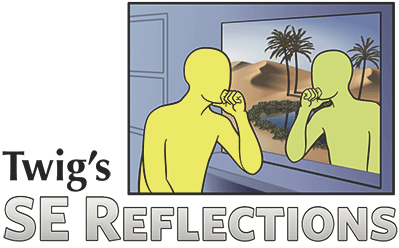Play Episode 51 Here
Podcast: Play in new window | Download
Subscribe: RSS
The first of an unknown number of mini-episodes from Twig’s SE Reflections. This one on a hopefully unnecessary worry of creating an intellectual cultural bias favoring the pro-social or Ventral Vagal stance at the cost of excluding (and stigmatizing?) those who don’t have or want it. Show Notes Page with with additional commentary.
[Note: I’m still working out some changes for the next 50 episodes of Twig’s SE Reflections after recieving positive and helpful feedback from listeners. Many thanks to those who took the time for that. In the meantime I’m going to share some mini-episodes of 5 minutes or less. Here’s the first, with a little written commentary in the show notes.]
Here’s something I don’t think is an active problem but something we need to be cautious of as SE Practitioners develop an intellectual community with a common language of what we like and what we don’t like.
We don’t want to become so attached to the idea of being Ventral Vagal oriented that we become exclusatory or inadvertently enforce stigmatization of people who are not currently – or may never want to be – very “pro-social.”
Let me explain.
Humans, as with our primate relatives, have a tendency to make social groups that reinforce our clan’s preferences. This is part of what makes being part of “the in group” feel so good – our behavior and choices are championed. We feel a part of something bigger than ourselves and are encouraged to think that we’re correct in our assumptions.
This is also why it feels so bad to be on the outside, shunned or not included – it suggests that we’re doing something wrong and that we are, in some sense, actually wrong.
As you and I grow more and more fond of the langauge associated to the Polyvagal theory (wiki) and begin using it as a short hand for naming beneficial features and calling out challenging ones, we’ll want to remember this basic tendency in human nature and try to avoid creating a “this is better than that” duality.
Of course it can be argued that mammals have a tendency toward Ventral Vagal dominance in their nervous system when they feel safe enough. That the resulting “pro-social” nature is spontaneous and a functional attribute of nervous system state is one of the great insights to be found in the – very cool and parsimonious – Polyvagal theory.
However, the exact same principle suggests that tendencies toward Sympathetic or Dorsal Vagal type behaviors such as high activation or desire for isolation are also informed by the autonomic nervous system and often describe the burden of accumulated stress and chronic neuroception of danger or life threat, even if we’re unaware that this is part of what’s going on. Ultimately this probably explains ourselves more than common cultural or psychological explainations of the associated expressions of personality (i.e. Type A or Extreme Introvert amongst others).
In this way, we can probably assume that many people would express more spontaneous pro-social behavior if they experienced less accumulated stress in their lives. Thus a bias toward signs of Ventral Vagal innervation are an understandable desire of ours as trauma focused helping care professionals.
At the same time, when we cheer the “that’s so Ventral” moments, in and out of sessions, we’ll want to remember that we live in a puralistic society of people, many of whom have experienced challenges that have led to the accumulation of stress – and personality formation around that stress – which makes social engagement itself a challenge or even truly undesirable. For that matter, on any given day even the most social of us might find seclusion the ideal state.
All that to say, people expressing SNS or DVC tendencies are no less human and no less worthy than those of us who have found the comforts to be gained by reinforcing pro-social experience.
While all of this is more a cultural concern far beyond the scope of being an SEP and I’d personally encourage everyone to feel free to choose their associations as they please, this does have a cricitally important session element given the nature of our work to provide a specialized conversation to our client’s suffering the impacts of accumulated stress, which often requires accurate joining and adjustment of our own behavior, if maybe only while we’re in service.
If we enter sessions with the notion that VVC expressions are somehow “good” and SNS or DVC expression somehow “bad” – whether we recognize this bias or not – than we surely miss the opportunity to provide the appropriate attunement to some of our clients – while inadvertently asking them to participate in activities that they’re simply unwanting or unwilling to do (such as orientation or chronic conversation) which is another way to help them fail at meeting our requests.
Yes, orientation and social engagement are a direction we’re trying to help people move toward and they have dramatic relevance clinically as interventions or therapeutic stance. Still, meeting people “where they’re at” is part of our game and creating a “good/bad” dichotomy will only get in the way.
So Yes indeed, let’s champion – as I surely will – the pleasures and opportunities of a pro-social life. And when our friends, colleagues, clients and even ourselves aren’t interested or able to join us in that “ideal,” let’s also remember that in the end we’re all in this together and one more good-bad mindset split isn’t going to help anyone.

